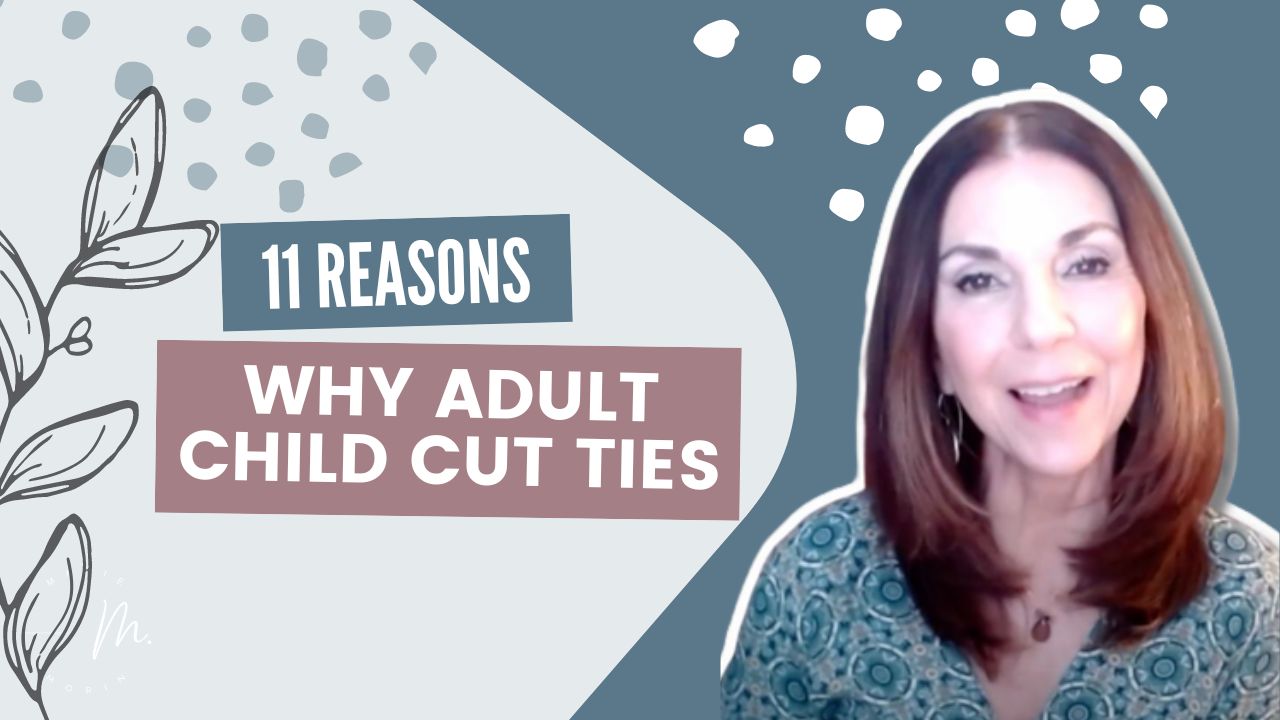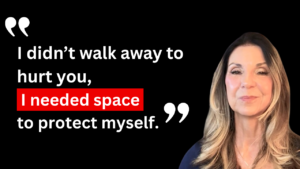Estrangement describes the condition within families that experience physical and or emotional distance from one or more family members. Family estrangement research explores the breakdown of relationships and its effects on family dynamics. Often there are years of problematic interactions and one shattering event that culminates in a family rift. In other cases, the reasons for estrangement can be more complicated to pinpoint.
This article discusses Eleven Reasons Why Adult Children Cut Ties.
It is generally accepted that if an adult child chooses estrangement, it is 100% the fault of the parents’ toxicity or abuse. However, researchers find that this explanation is more complex. The complexities of each family, such as genetics, personalities, and culture, play a large part in what may lead to estrangement. Below are 11 possible contributors to why your adult child chose estrangement.
11 Contributors To Estrangement
1. Divorce and Separation
Divorce and separation of parental figures may increase the likelihood of later estrangement for varied reasons. Any child will feel the disconnection from their parents and deal with it in their way. In some instances, one parent will alienate the other parent and paint them in a light that influences their child’s feelings. Divorce and separation are stressful on the child and may impact their long-term view of the family. Children or adult children will form their perspective on the divorce and create a way of dealing with it that makes sense to them. For some, estrangement from one or more parents might be how they cope with the complicated feelings that arise from divorce or separation.
2. Pressure From In-Laws
Dr. Joshua Coleman explains in his book Rules of Estrangement that adult children estrange when their partner feels threatened by their close parental relationship. Coleman adds that spouses can be troubled and insecure. Troubled spouses can set the stage for the adult child to cut off. Heartbroken estranged parents report stories of losing their adult child and contact with grandchildren. If an adult child’s spouse pushes for a separation between them and their parent, the adult child might follow suit to keep the peace with their spouse.
3.Mental Illness or Addiction
If your adult child is experiencing a struggle with their mental health, they might halt the relationship because of their current state of mind. The emotional work and pain that those with mental illness suffer are often excruciating for the parent to witness. The adult child could be unable to hold any relationship, including the one with their parents. On the other hand, if the parent is experiencing mental illness or addiction, the adult child might feel uncomfortable continuing the relationship. It might be upsetting and painful to deal with a parent’s addiction or mental illness due to its strain on communication, reliability, temperament, and so on. Estrangement is a means to avoid the tribulations of certain mental illnesses and addictions.
4. Their Therapist
With good reason, a therapist may suggest estrangement if it is imperative to the patient’s well-being; however, it may not always be the case. The patient receiving therapy is only painting one side of the picture. There could be influence from the therapist to estrange if what they are telling them warrants it. According to Joshua Colemans’ book Rules of Estrangement, sometimes a therapist may attribute causality between the parents’ past behaviors and the adult child’s current situation when many more factors could be at play.
5. Feeling Too Close
When adult children feel like they haven’t been able to individuate, they could estrange from one or both parents. The parent may have had too much control, or the child may have felt like they were too dependent on the parent during childhood, and rejecting the relationship is the only way to assume power.
6. Differing Values and Lifestyles
If the difference in values and lifestyle choices between adult children and parents is too significant, it may cause enough conflict to lead to estrangement. Our political, religious, and sexual identities could cause disagreements and discomfort when communicating. If the adult child feels like they are misunderstood or judged by their parents, they could choose to separate from the relationship as a means of self-preservation. Humans want to be understood and approved, and when one party cannot offer validation, estrangement is an option.
7. Unmet Expectations
When a parent breaks a standard, it feels like a violation of the relationship. Not having their expectations met could lead to an adult child cutting ties. If time and support by each party are not exchanged in a way that meets their expectations, the adult child might perceive the relationship to be low value and, therefore, cut ties. It’s essential to keep in mind the ever-changing social norms and what is expected of parents and adult children to upkeep an adult relationship. Both parties have different ideals, experience conflict, and discontinue the relationship.
8. Parenting
It’s become somewhat trendy to evaluate your childhood and attribute your current obstacles and dysfunctions to your upbringing. Due to this trend, parents and adult children are becoming estranged now more than ever since anything less than perfect parenting could lead to a separation. In other cases, parenting could be toxic enough for the adult child to leave the situation. Perhaps the parent was uninvolved, unloving, unaffectionate, or ambivalent. Suffering abuse and narcissism at the hands of your parents is more than enough reason to estrange. The adult child perceives the parenting failure as detrimental to their well-being, and keeping them close after the fact would be too difficult to bear.
9. Money
Adult children and their parents may have a sticky relationship with money. If an adult child is expecting unending financial support from their parents during times of trouble, it could cause a disagreement ending in estrangement. There might be a perception of unfair inheritances after losing a loved one with siblings, extended family, properties, etc. When no resolution occurs, this deep-rooted conflict might be the reason for estrangement.
10. Communication errors
Family matters and lack of proper and healthy communication are other reasons families might experience estrangement. On the extreme opposite side, families might dramatize and turn conflicts into a grand stage for attention. Folks who don’t know how to apologize or take responsibility without fighting or yelling may push one or more family members away. Family conflicts that never end in resolution could be the reason for estrangement.
11. Family secrets
Secrets surrounding family or marital issues are challenging in the family dynamic. Hardships such as drug or alcohol abuse, financial disturbances, and infidelity could be to blame. Being expected by a parent or sibling to withhold uncomfortable information from another family member is highly troublesome and may lead to separation.
Estrangement can be heartbreaking, and parents often rack their brains to figure out why their adult child cut ties. Whether you are the parent or the adult child, find comfort in knowing that you are not alone in this experience and there are resources to support you in your estranged condition. This article discusses Eleven Reasons Why Adult Children Cut Ties.









